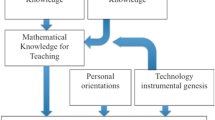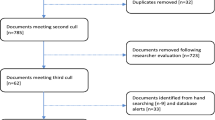Abstract
Issues of global and local importance such as climate change and homelessness require critical perspectives across multiple disciplines including science, technology, engineering and mathematics (STEM). Our paper brings critical mathematics education and social justice alongside STEM education to explore experiences of learning to teach. We focus specifically on learning to teach through creating mathematics problems in/for STEM and social justice. As a collaborative research group we are from five countries with varied cultural backgrounds, teaching experiences, and academic pathways. Dialogue as method is used to examine experiences of creating problems through which students can interpret and transform the world. Data collected included 46 h of audio-recorded dialogue meetings, 26 developed problems, and 7 interviews with 12 students. Results indicate creating mathematics problems in/for STEM involved navigating between mathematics, social justice, and STEM across all education levels and is supported with critical dialogue across cultural perspectives, diverse experiences, and expertise. Challenges lived include questioning the content of mathematics and STEM, deepening our own expertise to draw upon local and global problem contexts, and interrogating who benefits from such problems. Our study highlights the need for continued collaborative dialogue that not only gathers educators across disciplines but also includes students as co-creators of mathematics problems that could change their relationship with the world.
Similar content being viewed by others
References
Atweh, B., & Brady, K. (2009). Socially response-able mathematics education: Implications of an ethical approach. Eurasia Journal of Mathematics, Science and Technology Education, 5(3), 267–276.
Bartell, T. G. (2013). Learning to teach mathematics for social justice: Negotiating social justice and mathematical goals. Journal for Research in Mathematics Education, 44(1), 129–163.
Brantlinger, A. (2013). Between politics and equations: Teaching critical mathematics in a remedial secondary classroom. American Educational Research Journal, 50(5), 1050–1080.
Chu, S. K. W., Reynolds, R. B., Tavares, N. J., Notari, M., & Lee, C. W. Y. (2016). 21st century skills development through inquiry-based learning: From theory to practice. 21st century skills development through inquiry-based learning: From theory to practice (pp. 1–204). New York: Springer.
Clarke, B., Grevholm, B., & Millman, R. (2009). Tasks in primary mathematics teacher education. New York: Springer.
English, L. D. (2017). Advancing elementary and middle school STEM education. International Journal of Science and Mathematics Education, 15(1), 5–24.
European Parliament. (2015). Encouraging STEM studies for the labour market. http://www.europarl.europa.eu/studies. Accessed 11 March 2019.
Finkel, L. (2018). Infusing social justice into the science classroom: Building a social justice movement in science education. The Journal of Educational Foundations, 31(1/2), 40–58.
Fitzallen, N. (2016). STEM education: What does mathematics have to offer ? In Proceedings of the 38th Annual Conference of the Mathematics Education Research Group of Australasia, (pp. 237–244).
Frankenstein, M. (1987). Critical mathematics education: An application of Paulo Freire’s epistemology. In I. Shor (Ed.), Freire for the classroom: A sourcebook for liberatory teaching (pp. 180–210). Portsmouth, NH: Heinemann.
Frankenstein, M. (2012). Beyond math content and process: Proposals for underlying aspects of social justice education. In A. Wager & D. W. Stinson (Eds.), Teaching mathematics for social justice: Conversations with educators. Reston, VA: National Council of Teachers of Mathematics.
Freire, P. (1970/2000). Pedagogy of the oppressed. New York, NY: Bloomsbury.
Freire, P. (1998). Pedagogy of freedom: Ethics, democracy and civic courage. Lanham, Maryland: Rowman and Littlefield.
Gapminder.org Dollar Street. https://www.gapminder.org. Accessed 1 Sept 2018.
Government of Canada. (2018). The Government of Canada and STEM. https://www.ic.gc.ca/eic/site/013.nsf/eng/00014.html. Accessed 11 March 2019.
Grant, T. J., & Lo, J.-J. (2009). Reflecting on the process of task adaptation and extension: The case of computational starters. In B. Clarke, B. Grevholm, & R. S. Millman (Eds.), Tasks in primary mathematics teacher education: Purpose, use and exemplars (pp. 25–36). New York: Springer.
Gutstein, E. (2006). Reading and writing the world with mathematics: Toward a pedagogy for social justice. New York, NY: Routledge.
Gutstein, E. (2012). Connecting community, critical and classical knowledge in teaching mathematics for social justice. In S. Mukhopadhyay & W. M. Roth (Eds.), Alternative forms of knowing (in) mathematics: Celebrations of diversity of mathematical practices (pp. 299–312). The Hague: Sense.
Gutstein, E., & Peterson, B. (2013). Rethinking mathematics: Teaching social justice by the numbers. Milwaukee, WI: Rethinking Schools.
Jungck, J., & Manon, J. (2019). Brave spaces: Augmenting interdisciplinary STEM education by using quantitative data explorations to engage conversations on equity and social justice. Numeracy. https://doi.org/10.5038/1936-4660.12.1.4.
Kokka, A. (2018). Radical STEM teacher activism: Collaborative organizing to sustain social justice pedagogy in STEM fields. The Journal of Educational Foundations, 31(1), 86–113.
Kozan, S., Blustein, D. L., Barnett, M., Wong, C., Connors-Kellgren, A., Haley, J., et al. (2017). Awakening, efficacy, and action: A qualitative inquiry of a social justice-infused, science education program. Analyses of Social Issues and Public Policy, 17(1), 205–234. https://doi.org/10.1111/asap.12136.
Kumashiro, K. (2018). Why and how STEM education matters in social justice movements. The Journal of Educational Foundations, 31(1–2), 3–5.
Leggon, C., & Gaines, M. S. (2017). STEM and social justice: Teaching and learning in diverse settings: A global perspective. New York: Springer.
Leonard, J., Brooks, W., Barnes-Johnson, J., & Berry, R. Q. (2010). The nuances and complexities of teaching mathematics for cultural relevance and social justice. Journal of Teacher Education, 61(3), 261–270.
Marshall, J., & Reason, P. (2008). Taking an attitude of inquiry. In B. Boog, J. Preece, M. Slagter, & J. Zeelen (Eds.), Towards quality improvement of action research: Developing ethics and standards (pp. 61–81). The Hague: Sense.
National Education Association. (2012). Preparing 21st century students for a global society: An educator’s guide to “the four Cs.” Washington, DC: Author. http://www.nea.org/assets/docs/A-Guide-to-Four-Cs.pdf. Accessed 11 March 2019.
National Research Council. (2012). Education for life and work: Developing transferable knowledge and skills in the 21st century. Washington, DC: The National Academies Press.
National Science and Technology Council and Committee on STEM Education. (2018). Charting a course for success: America’s strategy for stem education. http://www.whitehouse.gov/ostp. Accessed 11 March 2019.
Office of the Chief Scientist. (2016). Australia’s Stem Workforce: Science, Technology, Engineering and Mathematics. https://www.chiefscientist.gov.au/2016/03/report-australias-stem-workforce/. Accessed 11 March 2019.
O’Neil, C. (2016). Weapons of math destruction: How big data increases inequality and threatens democracy. New York: Crown.
P21. (2018). Our vision and mission. P21 Partnership for 21st century learning. http://www.p21.org/about-us/our-mission. Accessed 10 Sept 2018.
Parkin, A. (2018). Supporting education transformation in Canada. https://canada2067.ca/app/uploads/2018/11/Canada-2067-Supporting-Education-Transformation-in-Canada_Final.pdf. Accessed 11 March 2019.
Prestage, S., & Perks, P. (2007). Developing teacher knowledge using a tool for creating tasks for the classroom. Journal of Mathematics Teacher Education, 10(4), 381–390.
Royal Society Science Policy Centre. (2014). Vision for science and mathematics education. https://royalsociety.org/topics-policy/projects/vision/. Accessed 11 March 2019.
Shaughnessy, M. (2013). Mathematics in a STEM context. Mathematics Teaching in the Middle School, 18(6), 324. https://doi.org/10.5951/mathteacmiddscho.18.6.0324.
Skovsmose, O. (1994). Towards a philosophy of critical mathematics education. Dordrecht: Kluwer.
Skovsmose, O. (2012). Towards a critical mathematics education research programme? In O. Skovsmose & B. Greer (Eds.), Opening the cage: Critique and politics of mathematics education (pp. 343–368). The Hague: Sense.
Skovsmose, O. (2016). What could critical mathematics education mean for different groups of students? For the Learning of Mathematics, 36(1), 2–7.
Smith, A. (2017). Report of Professor Sir Adrian Smith’s Review of Post-16 Mathematics. https://www.gov.uk/government/uploads/system/uploads/attachment_data/file/630488/AS_review_report.pdf Accessed 11 March 2019.
Sobel, D. (1998). Mapmaking with children. Portsmouth, NH: Heinemann.
UK HM Government. (2017). Industrial strategy: Building a Britain fit for the future. Royal United Services Institution Journal. https://www.gov.uk/government/publications/industrial-strategy-building-a-britain-fit-for-the-future. Accessed 11 March 2019.
United Nations. (2018). Sustainable development goals knowledge platform. https://sustainabledevelopment.un.org. Accessed 5 May 2018.
United Nations High Commission on Refugees. (2018). Forced displacement at record 68.5 million. Author. https://www.unhcr.org/news/stories/2018/6/5b222c494/forced-displacement-record-685-million.html. Accessed 11 March 2019.
Vithal, R. (2012). Mathematics education, democracy and development: Exploring connections. Pythagoras, 33(2), 1–14. https://doi.org/10.4102/pythagoras.v33i2.200.
Wager, A., & Stinson, D. (2012). Teaching mathematics for social justice: Conversations with educators. Reston, VA: National Council of Teachers of Mathematics.
Wang, X., Xu, W., Guo, L., Wang, X., Xu, W., & Guo, L. (2018). The status quo and ways of STEAM education promoting China’s future social sustainable development. Sustainability, 10(12), 4417.
Wells, G. (2009). Dialogic inquiry as collaborative action research. In S. Noffke & B. Somekh (Eds.), The SAGE handbook of educational action research (pp. 50–61). London, UK: SAGE.
World Health Organization. (2019). International push to improve food safety. https://www.who.int/news-room/detail/12-02-2019-international-push-to-improve-food-safety. Accessed 18 Feb 2019.
Zeidler, D. L. (2016). STEM education: A deficit framework for the twenty first century? A sociocultural socioscientific response. Cultural Studies of Science Education, 11(1), 11–26.
Author information
Authors and Affiliations
Corresponding author
Additional information
Publisher's Note
Springer Nature remains neutral with regard to jurisdictional claims in published maps and institutional affiliations.
Rights and permissions
About this article
Cite this article
Nicol, C., Bragg, L.A., Radzimski, V. et al. Learning to teach the M in/for STEM for social justice. ZDM Mathematics Education 51, 1005–1016 (2019). https://doi.org/10.1007/s11858-019-01065-5
Accepted:
Published:
Issue Date:
DOI: https://doi.org/10.1007/s11858-019-01065-5




